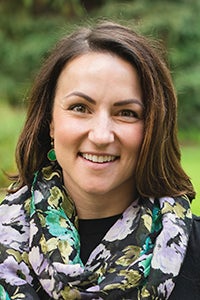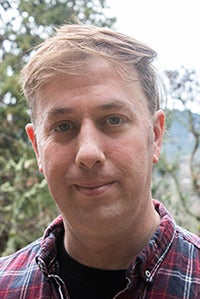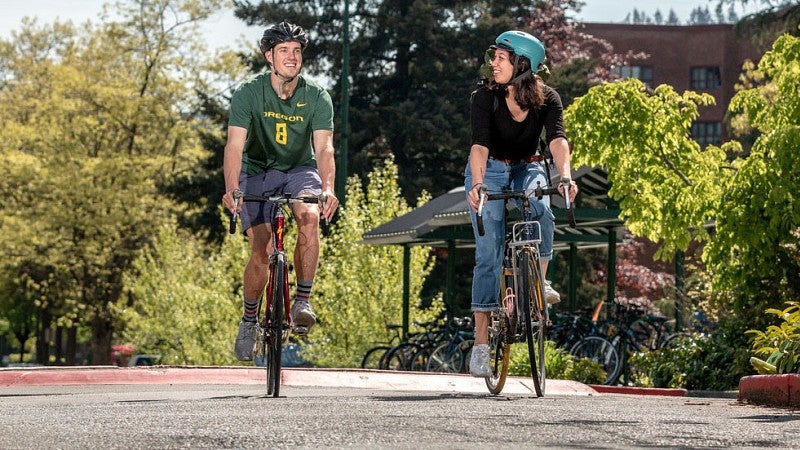While the climate crisis is a global issue that cannot be solved by any one person or entity alone, individuals can still take meaningful actions. At the time of year when we resolve to be better versions of ourselves, UO experts offer some suggestions for resolutions that individuals can adopt to counter climate change and help green up their lives, their communities, and the planet.
Each of these faculty members is affiliated with the UO's Environment Initiative, which focuses the intellectual energy and work of faculty members, students and community partners on working toward a just and livable future through transdisciplinary research, teaching and experiential learning. It is one of the UO's five Academic Initiatives that work across disciplines, developing the next generation of leaders and problem solvers.
From planting trees to having important conversations with friends and families, here are their ideas for climate-friendly resolutions for 2022.
Turn to collective knowledge to address environmental issues
John Arroyo
Assistant professor, School of Planning, Public Policy and Management
Director, Pacific Northwest Just Futures Institute for Racial and Climate Justice
Environment Initiative faculty fellow, fall 2021
 Collaboration is key to building a more just future, Arroyo said. He is the director of the new Pacific Northwest Just Futures Institute for Racial and Climate Justice, which aims to be an applied, transdisciplinary research platform for the region. Arroyo stresses the need to build - and maintain - relationships beyond campus, collaboratively design research projects and outcomes, and inspire research that uses collective knowledge on campus to solve environmental problems. "As we work towards mutual goals, the life and natural sciences can learn from the humanities and social sciences, and vice versa. Our students should learn as much from applied policy reports and natural experiments as they can learn from poetry, fiction, popular journalism and ethnographies. The future ability to identify and operationalize truly collaborative strategies for a just future will require this unique, comprehensive perspective, which is central to the core of the Pacific Northwest Just Futures Institute for Racial and Climate Justice."
Collaboration is key to building a more just future, Arroyo said. He is the director of the new Pacific Northwest Just Futures Institute for Racial and Climate Justice, which aims to be an applied, transdisciplinary research platform for the region. Arroyo stresses the need to build - and maintain - relationships beyond campus, collaboratively design research projects and outcomes, and inspire research that uses collective knowledge on campus to solve environmental problems. "As we work towards mutual goals, the life and natural sciences can learn from the humanities and social sciences, and vice versa. Our students should learn as much from applied policy reports and natural experiments as they can learn from poetry, fiction, popular journalism and ethnographies. The future ability to identify and operationalize truly collaborative strategies for a just future will require this unique, comprehensive perspective, which is central to the core of the Pacific Northwest Just Futures Institute for Racial and Climate Justice."
Walk or bike more, drive less
Lauren Hallett
Assistant professor, Department of Biology and Environmental Studies Program
 "A car-dependent society drives both nitrogen deposition and climate change," Hallett said. She sees this damage through her work as a restoration ecologist, where she aims to conserve vulnerable species, like serpentine grasslands that support native flowers. "But nitrogen deposition from car traffic has enabled invasive grasses to enter and dominate the system," she said. Her research tests ways to deal with this issue, like how grazing and burning can remove the grasses and restore the flowers, "but it rarely addresses the underlying problem of car dependence," she explained. So, her resolution is to work toward addressing that underlying issue, in addition to its symptoms. She plans to reduce her family's car dependence by using an electric cargo bike to get her young son to day care and advocate for more walkable and less car-dependent neighborhoods. "My first step will be showing up at public hearings and voicing support for effective implementation of new statewide reforms here in Eugene."
"A car-dependent society drives both nitrogen deposition and climate change," Hallett said. She sees this damage through her work as a restoration ecologist, where she aims to conserve vulnerable species, like serpentine grasslands that support native flowers. "But nitrogen deposition from car traffic has enabled invasive grasses to enter and dominate the system," she said. Her research tests ways to deal with this issue, like how grazing and burning can remove the grasses and restore the flowers, "but it rarely addresses the underlying problem of car dependence," she explained. So, her resolution is to work toward addressing that underlying issue, in addition to its symptoms. She plans to reduce her family's car dependence by using an electric cargo bike to get her young son to day care and advocate for more walkable and less car-dependent neighborhoods. "My first step will be showing up at public hearings and voicing support for effective implementation of new statewide reforms here in Eugene."
Plant trees
Yekang Ko
Associate professor, Department of Landscape Architecture, School of Architecture & Environment
Director, APRU Sustainable Cities and Landscapes Hub
 "Trees provide our communities with many benefits, including combating urban heat and saving energy," said Yekang Ko, whose work focuses on the ways cities can better coexist with the natural landscapes around them. "Unfortunately, we are losing them at a faster pace through development and increasing extreme weather events driven by climate change." Plant more trees in your yards, neighborhoods and in underserved communities, Ko said, adding that planting the right trees in the right places can maximize their benefits. For example, she points to a "Nature Explorer" data tool that shows tree canopy is inequitably distributed, with lower tree canopy cover in low-income communities. "Those houses tend to be poorly insulated; they can get the most benefit of tree shade. Research shows that planting trees on the west side of houses can improve thermal comfort and energy saving for cooling in summer," Ko said. Selecting climate-appropriate trees such as Oregon white oak and Douglas fir, she said, can better survive in drought and floods, thus providing more long term benefits.
"Trees provide our communities with many benefits, including combating urban heat and saving energy," said Yekang Ko, whose work focuses on the ways cities can better coexist with the natural landscapes around them. "Unfortunately, we are losing them at a faster pace through development and increasing extreme weather events driven by climate change." Plant more trees in your yards, neighborhoods and in underserved communities, Ko said, adding that planting the right trees in the right places can maximize their benefits. For example, she points to a "Nature Explorer" data tool that shows tree canopy is inequitably distributed, with lower tree canopy cover in low-income communities. "Those houses tend to be poorly insulated; they can get the most benefit of tree shade. Research shows that planting trees on the west side of houses can improve thermal comfort and energy saving for cooling in summer," Ko said. Selecting climate-appropriate trees such as Oregon white oak and Douglas fir, she said, can better survive in drought and floods, thus providing more long term benefits.
Inspire and support students
Steve Mital
UO sustainability director
 "Climate anxiety is rising," said Steve Mital, who leads sustainability efforts on the UO campus. He points to a 2021 study of global youth, which found that 60 percent of those age 16 to 25 were "very" or "extremely" worried about global warming. "Many educators say their students are drowning in despair," Mital said. "Kurt Hahn, founder of Outward Bound, believed experiences that inspire people to rise above adversity are essential to developing resilience. Hahn said, 'The foremost task of education is to insure the survival of these qualities: an enterprising curiosity, an undefeatable spirit, tenacity in pursuit, readiness for sensible self-denial, and above all, compassion.'" Mital said academic initiatives like the Prison Exchange Program and the Environmental Leadership Program, and cocurricular experiences like those offered by the Student Sustainability Center, immerse students in real-world contexts that build the intellectual and emotional fortitude needed to engage environmental and social crises. "In 2022, I hope more faculty and staff commit to design similar whole-person educational programs."
"Climate anxiety is rising," said Steve Mital, who leads sustainability efforts on the UO campus. He points to a 2021 study of global youth, which found that 60 percent of those age 16 to 25 were "very" or "extremely" worried about global warming. "Many educators say their students are drowning in despair," Mital said. "Kurt Hahn, founder of Outward Bound, believed experiences that inspire people to rise above adversity are essential to developing resilience. Hahn said, 'The foremost task of education is to insure the survival of these qualities: an enterprising curiosity, an undefeatable spirit, tenacity in pursuit, readiness for sensible self-denial, and above all, compassion.'" Mital said academic initiatives like the Prison Exchange Program and the Environmental Leadership Program, and cocurricular experiences like those offered by the Student Sustainability Center, immerse students in real-world contexts that build the intellectual and emotional fortitude needed to engage environmental and social crises. "In 2022, I hope more faculty and staff commit to design similar whole-person educational programs."
Have conversations with family, friends and coworkers about emergency preparedness
Hollie Smith
Assistant professor, School of Journalism and Communication
Associate director, Center for Science Communication Research
 Considering the increase of catastrophic wildfires, flooding, and other disasters stemming from global warming, Hollie Smith stresses the importance of being prepared and knowing where to go for information about natural hazards in the community. "We all know that having an emergency plan is important," said Smith, a former reporter who now researches how the media portrays scientific information and how people use it to make decisions. "But it's something that is easy to keep putting off and has been even more challenging to think about in the past two years. A critical first step, in my opinion, is learning where to go for trustworthy information. Ready.gov is a good resource for general information before an emergency. Local government agencies and other organizations are a good resource for community-level information before, during and after an emergency. Once you have good information, you can start making a family plan, practice it and share that information with your own network."
Considering the increase of catastrophic wildfires, flooding, and other disasters stemming from global warming, Hollie Smith stresses the importance of being prepared and knowing where to go for information about natural hazards in the community. "We all know that having an emergency plan is important," said Smith, a former reporter who now researches how the media portrays scientific information and how people use it to make decisions. "But it's something that is easy to keep putting off and has been even more challenging to think about in the past two years. A critical first step, in my opinion, is learning where to go for trustworthy information. Ready.gov is a good resource for general information before an emergency. Local government agencies and other organizations are a good resource for community-level information before, during and after an emergency. Once you have good information, you can start making a family plan, practice it and share that information with your own network."
Incorporate actionable solutions into climate education
Sarah Stapleton
Assistant professor, College of Education
Environment Initiative faculty fellow, Spring 2022
 "I urge everyone teaching students at any level or discipline to teach about climate change and environmental justice as it relates to their content area. Research shows that it is critical to incorporate concrete, actionable solutions into climate education and communication so that students are left with hope and direction," said Sarah Stapleton, who will be working with a teacher team to develop an environmental justice curriculum for high school teachers in Oregon through her faculty fellowship with the Environment Initiative. "Highlighting environmental actors, especially those who are Indigenous and other people of color, as well as local groups and organizations working toward environmental and climate justice, is one way to help students see actionable change and not feel alone in the work ahead." She also believes the pandemic has given everyone an opportunity to rethink things like work travel and commuting and move rapidly toward what we really value, "like more time for loved ones, free school meals for all children in K-12 public schools, more community with each other, more time outside, and more redressing of injustices."
"I urge everyone teaching students at any level or discipline to teach about climate change and environmental justice as it relates to their content area. Research shows that it is critical to incorporate concrete, actionable solutions into climate education and communication so that students are left with hope and direction," said Sarah Stapleton, who will be working with a teacher team to develop an environmental justice curriculum for high school teachers in Oregon through her faculty fellowship with the Environment Initiative. "Highlighting environmental actors, especially those who are Indigenous and other people of color, as well as local groups and organizations working toward environmental and climate justice, is one way to help students see actionable change and not feel alone in the work ahead." She also believes the pandemic has given everyone an opportunity to rethink things like work travel and commuting and move rapidly toward what we really value, "like more time for loved ones, free school meals for all children in K-12 public schools, more community with each other, more time outside, and more redressing of injustices."
Participate in your local watershed council
Jeremy Trombley
Postdoctoral researcher, Department of Earth Sciences
 "Councils host meetings and presentations as well as opportunities to help restore the landscape for fish and other species," said Jeremy Trombley, an anthropologist who works with professor Dave Sutherland's Ice and Ocean Lab and professor Mark Carey's Glacier Lab researching how watershed communities are responding to climate change. He urges individuals to go beyond the first step by getting more involved and asking tougher questions. "How is your watershed affected by external social, economic and political pressures? How do these pressures keep your community from responding to climate change effectively? Finally, find out whose stolen land your watershed occupies and look to those Indigenous nations for guidance," he said. "They are at the forefront of addressing climate change, and it's important that we pay attention and follow their lead when it comes to ensuring the long-term health and well-being of our watersheds and communities."
"Councils host meetings and presentations as well as opportunities to help restore the landscape for fish and other species," said Jeremy Trombley, an anthropologist who works with professor Dave Sutherland's Ice and Ocean Lab and professor Mark Carey's Glacier Lab researching how watershed communities are responding to climate change. He urges individuals to go beyond the first step by getting more involved and asking tougher questions. "How is your watershed affected by external social, economic and political pressures? How do these pressures keep your community from responding to climate change effectively? Finally, find out whose stolen land your watershed occupies and look to those Indigenous nations for guidance," he said. "They are at the forefront of addressing climate change, and it's important that we pay attention and follow their lead when it comes to ensuring the long-term health and well-being of our watersheds and communities."







